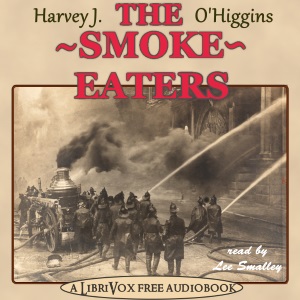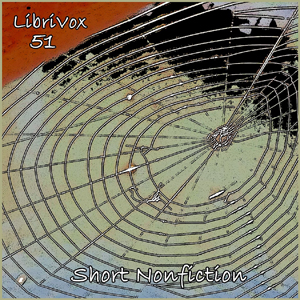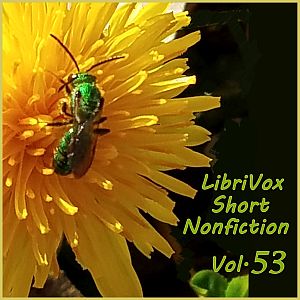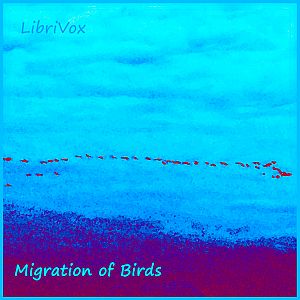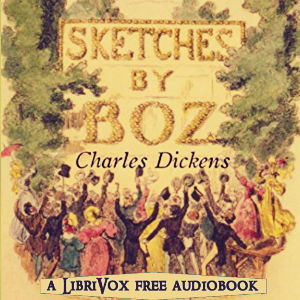Internet Archive, which hosts our audio books, is in the midst of their annual fund-raising. They have also begun a drive to provide a mirror site in Canada to ensure IA's availability to all users. The IA is a vast library with millions of public domain books, audio, film, radio, and other media. They also maintain an open library of copyrighted books one can 'check out' by becoming a member with a virtual library card. This collection is devoted to the concept of why we need a public library, the title taken from an essay by Chalmers Hadley, which will be the first entry in this audio book. The rest of the collection is pulled from Project Gutenberg's Library selections. Some are solo essays, most are chapters from selected books on library science and culture. I'm also open to including up to 5 chapters or short works from the list of banned books on PG's site to emphasize the need for a public library. - Summary by Matt Pierard
32 episodes
A 1973 U.S. government publication describing the history and physical characteristics of this Arizona national monument within the boundaries of the Navajo Nation. - Summary by david wales
3 episodes
Creative Evolution (French: L'Évolution créatrice) is a 1907 book by French philosopher Henri Bergson. Its English translation appeared in 1911. The book provides an alternate explanation for Darwin's mechanism of evolution, suggesting that evolution is motivated by an élan vital, a "vital impetus" that can also be understood as humanity's natural creative impulse. The book was very popular in the early decades of the twentieth century, before the Neodarwinian synthesis was developed.The book also develops concepts of time (offered in Bergson's earlier work) which significantly influenced modernist writers and thinkers such as Marcel Proust. For example, Bergson's term "duration" refers to a more individual, subjective experience of time, as opposed to mathematical, objectively measurable "clock time." In Creative Evolution, Bergson suggests that the experience of time as "duration" can best be understood through creative intuition, not through intellect. - Summary by Wikipedia
22 episodes
The Mentor Association was established to increase interest and knowledge among the public in the areas of art, literature, science, nature, history and travel. The association published a magazine twice monthly, each dealing with a different topic and often written by a recognized authority of the day. They were easy to read, visually appealing and affordable. This collection includes selections from issues dating from 1913-1919. - Summary by Lynne Thompson
26 episodes
François Fénelon became a priest in 1675, Archbishop of Paris in 1679, was spiritual advisor to Madame Guyon, and was appointed tutor to Louis, Duke of Burgundy (1682-1712) by Louis XIV in 1689. He wrote Dialogues of the Dead, and The Lives of the Ancient Philosophers as well as The Adventures of Telemachus expressly for his instruction. Fenelon wrote against the Jansenists and in favor of the Jesuits. He is also known for his Christian Perfection: Devotional Reflections on the Christian Life and Treatise on the Education of Girls.. - Summary by Wikipedia
31 episodes
Fifteen short nonfiction works in the public domain, independently chosen by the readers. Topics include philosophy and thought--Phtah-Hotep, Petrarch, Diderot, Bertrand Russell, and the Weymouth New Testament; adventure and travel--a survival story by Mark Twain and a woman's sojourn in Saltillo, Mexico; immigration and war--Benjamin Franklin on the assimilation of German speakers, Lincoln's Gettysburg Address, the League of Nations, and an essay on potatoes and war; geology--on the origins of chalk; a critique of one-act plays, a biography of H.H. Munro (Saki), and Emerson's advice to Thoreau to clear his brain by writing poetry.
Aphorisms by Diderot was translated by Margaret Jourdain
Petrarch's Secret was translated by William H. Draper
The Instruction of Ptah-Hotep was translated by Battiscombe G. Gunn
15 episodes
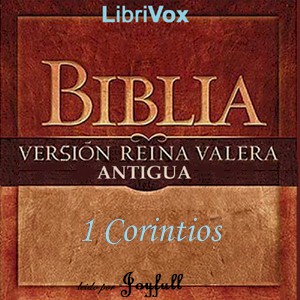
La ciudad de Corinto estaba en el corazón de una ruta comercial principal en el mundo antiguo. Como muchas ciudades que trabajan en el comercio, Corinto tenía fama de inmoralidad sexual, diversidad religiosa y corrupción. La iglesia que Pablo plantó allí (Hechos 18) se tambaleaba bajo todas estas influencias y comenzó a dividirse sobre varios temas. La Primera carta a los Corintios aborda muchas de las preguntas prácticas que dividen a la iglesia - preguntas concernientes a cosas tales como dones espirituales, matrimonio, alimento ofrecido a los ídolos, y la resurrección. Pablo instó a los corintios a que se unificaran y a entregarse plenamente a la obra del Señor. El capítulo 13 incluye un pasaje muy conocido sobre la naturaleza y la importancia del amor. Pablo escribió la primera carta a los Corintios desde Éfeso en la primavera del año 55 D.C.
=============================
The city of Corinth was at the heart of a major commercial route in the ancient world. Like many cities working in commerce, Corinth had a reputation for sexual immorality, religious diversity, and corruption. The church that Paul planted there (Acts 18) staggered under all these influences and began to be divided on several matters. The First Letter to the Corinthians addresses many of the practical questions that divide the church - questions concerning such things as spiritual gifts, marriage, food offered to idols, and resurrection. Paul urged the Corinthians to be united and give themselves fully to the work of the Lord. Chapter 13 includes a well-known passage about the nature and importance of love. Paul wrote the first letter to the Corinthians from Ephesus in the spring of AD 55. - Summary by Claudia Barrett
16 episodes
This precursor to The New Yorker magazine features several Algonquin Roundtable regulars, including Broun, Woolcott, and Morley. Editor is John C. Farrar, an American editor, writer and publisher. Farrar founded two publishing companies — Farrar & Rinehart and Farrar, Straus and Giroux. ( Matt Pierard)
26 episodes
Sixteen short nonfiction works in the public domain, independently chosen by the readers. Topics include science and natural history--carnivorous plants, tadpoles, tent caterpillars, flights of birds, horse training, dogs, children's sign language, trees in winter, and night noises in the woods; philosophy--Roger Bacon and Nicholas of Cusa; satire and literary criticism--the movies as "stupies," bustles, and facetious plots for short stories by Dorothy Parker; also an appraisal of Conrad Aiken's poetry, and an intimate look at Abraham Lincoln's early life in Illinois. (Summary by Sue Anderson)
16 episodes
Seventeen short nonfiction works in the public domain, independently chosen by the readers. Topics include science and natural history--the donkey, forestry, grape vines, astronomy, historian Agnes Mary Clerke, and Greek botanist Theophrastus ; philosophy-- Nicholas of Cusa and Emmanuel Kant; Sommerset Maugham's reminiscences of Spain; Joseph Conrad's sea stories; an encounter with a long-ago companion who has contracted leprosy (Joe of Lahaina); working in the dead-letter office; a dinner the painter Benjamin Hayden hosted for Wordsworth, Keats, and Charles Lamb; a portrait of Margaret Fuller by R.W. Emerson; a 19th century account of English character written for the Chinese; and celebrations of American ideals of freedom and self government--Makers of the Flag, An Oration on Thomas Paine, and Thomas Jefferson's 4th of July letter. - summary by Sue Anderson
17 episodes
"LibriVox is a hope, an experiment, and a question: can the net harness a bunch of volunteers to bring books in the public domain to life..."
Hugh McGuire, LibriVox's founder, August 9, 2005This year is the 12th anniversary of our beloved LibriVox. The readings in this collection celebrate that "bunch of volunteers" who make up the worldwide LibriVox community. The readings are held together by their connection to the words "twelve" or "dozen" The collection is multilingual. The selections, which are chosen by the readers, include fiction, nonfiction, poems, short stories, and articles.Cast list for "The Baker's Dozen"Major Richard Dumbarton: Peter YearsleyMrs. Carewe: Devorah AllenMrs. Paly-Paget: Sue AndersonStage Directions: MaryAnn Spiegel
31 episodes
This book vividly brings to life the unimaginable risks of fire-fighting and the bravery and personal interactions of Captain Meaghan and the crew of Hook & Ladder Company No. 0 in New York City.
A 1905 review in the New York Times notes:
“’The Smoke-Eaters’…is one of those rare good treats that fall to the reviewer’s lot…. There is enough humor and pathos of a grim and rugged sort, enough tense life and excitement and thrilling heroism to make a dozen...of the ordinary run of books, and it is all told with a straightforward simplicity that well accords with the single-hearted devotion to duty of the men who...‘eat smoke and spit black buttons’…. Not only are they the best sort of stories about firemen, but some of them would stand as models of all that any short story should be – so compact, so restrained, and yet possessed of a vigor and force that keep expectation keyed to the highest tension.”
A pdf of the FULL REVIEW may be accessed
here:
– Lee Smalley
11 episodes
This is a United States National Parks guidebook written by a popular young people's nature writer, Jean Craighead George. It covers the Everglades in detail, from its mangrove swamps to its sawgrass prairies. (Summary by Matt Pierard)
10 episodes
Seventeen short nonfiction works in the public domain, independently chosen by the readers. Topics include philosophy--Bertrand Russell, Spinoza, and Epictetus; science and invention--the Wright brothers, Leibniz, arctic explorer Sir John Franklin, spider webs, and cylindrical silos; plays and cinema--Lillian Gish and Friedrich Schiller; satire--selections from Ambrose Bierce, Robert Benchley, and Seneca; biographies--Aaron Burr, and Sophia Packard of Spellman College; the murder of Archbishop Charles Seghers in Alaska in 1886; and a history of Torre Abbey in England.
Summary by Sue Anderson
Against the Epicurean and Academics was translated by T. W. Rolleston.
17 episodes
April, 1865 -- The war ended and throughout the Northern States joy and relief reigned. Then, less than a week later, a thunderbolt: the president was dead -- struck down by an assassin's bullet. Could this have been the mad act of a single demented actor? Or was there a wider conspiracy to be rooted out? At this dark moment of national confusion, rage and despair, would the provisions of the Constitution and the procedures of established law be able to deal with the crisis -- or would extralegal methods be needed? Summary by Delmar H. Dolbier
17 episodes

1-2 Pedro
Los lectores de la primera carta del Apóstol Pedro estaban confundidos y desalentados por la persecución que estaban experimentando a causa de su fe. Pedro los exhortó a permanecer firmes, recordándoles repetidamente el ejemplo de Cristo, las riquezas de su herencia en Él y la esperanza de que volverá a llevarlos al cielo. Explicó cómo los cristianos deben responder cuando sufren debido a sus creencias. Llamado el "apóstol de la esperanza", el mensaje de Pedro es primordial para confiar en el Señor, vivir obedientemente sin importar las circunstancias, y mantener su esperanza "fija en la promesa de Dios de liberarnos." El sufrimiento es de esperarse, pero es temporal y producirá grandes bendiciones para los que permanecen firmes. Se cree que Pedro escribió esta carta a mediados de los años 60 dC.
la Segunda carta del Apóstol Pedro probablemente fue escrita poco antes de su muerte (alrededor del año 67 dC). Pedro describe en términos vívidos cómo versiones torcidas de la verdad cristiana estaban siendo enseñadas, recordando su experiencia de primera mano acerca de la gloria de Cristo en la Transfiguración. Pedro explica la verdad más segura del evangelio como un antídoto para la herejía. El evangelio es como "una lámpara que brilla en un lugar oscuro" En el capítulo 3 Pedro se enfoca en aquellos que se burlan de la idea del regreso triunfal de Cristo y del juicio final. Así como Dios una vez destruyó la tierra con agua, un día la destruirá con fuego. A la luz de esto, debemos vivir en "santidad y piedad" mientras esperamos el regreso del Señor Jesucristo y la salvación que El ha prometido a todos los que creen en El.
====================
The readers of the first letter of the apostle Peter were confused and discouraged by the persecution they were encountering because of their faith. Peter urged them to stand firm, reminding them repeatedly of Christ's example, the riches of his inheritance in Him, and the hope that He would bring them back to heaven to be with Him. He explained how Christians should respond when they suffer because of their beliefs. Called the "apostle of hope," Peter's message is paramount to trust in the Lord, to live obediently regardless of circumstances, and to keep our hope "fixed on God's ultimate promise of deliverance." Suffering is expected, but it is temporary and yields great Blessings for those who stand firm. Peter wrote this letter in the mid 60s AD
2 Peter was probably written shortly before his death. Twisted versions of Christian truth were being taught, which Peter describes in vivid terms. Recalling his firsthand experience of the glory of Christ in the transfiguration. Peter explains the gospel's truth as an antidote for heresy. The gospel is like "a lamp shining in a dark place" In chapter 3 Peter focuses on those who make fun of the idea of Christ triumphant return and final judgment. Just as God once destroyed the earth with water, one day He will destroy it with fire. In light of this, we must live in "holiness and godliness" as we await the return of the Lord Jesus Christ and the salvation He has promised to all who believe in Him.
- Summary by Claudia R. Barrett
8 episodes
Seventeen short nonfiction works in the public domain, independently chosen by the readers. Topics include Nature and Science--fall scenery, rose oil, large type books for low vision, the pulmotor, and the method of scientific investigation; Philosophy and Thought--Joseph Priestly, Kierkegaard, Rousseau, and A.C. Bradley on poetry; History and Travel--John Johnston founder of Sault St. Marie, eating in Berlin, and Sir John Mandeville's travels; a Japanese folk tale; a defense of Lady Bryon by Harriet Beecher Stowe, and a Virginia slave narrative by Minnie Fulkes. (Summary by Sue Anderson)"Preparation for a Christian Life" was translated by Lee M. Hollander.
17 episodes

For those who like courtroom drama, here are Ingersoll’s Opening and Closing arguments on the most famous trials of his career--the Star Route Trials which stretched over 2 years, revealing high government corruption in the U.S. Post Office system's westward expansion. Ingersoll was lead counsel for the defense. Compiled from countless reports and endless conflicting details (much like untangling a huge pile of fishing line), it was said that his prodigious memory of the minutest details without referring to the record, knowledge of the law, impregnable logic, forensic power, lucidity, almost infallible judgment, remarkable ability as an orator that kept the courtroom spellbound; his uniform fairness, tact, candor, humor, and matchless summing up, are vividly captured in these transcripts. "He absolutely made no mistakes", said one federal judge. This volume also contains 3 shorter trial summations: the Munn Trial, the Davis Will Case, and the Russell Case. This is the entirety of Volume X, Dresden Edition, pub. 1900. ~ Summary by Michele Fry
44 episodes
Alice Meynell was an English essayist, critic, and poet who was also a leading suffragist, serving as vice-president of the Women Writers' Suffrage League, She and her husband Wilfrid Meynell were active in publishing and editing literary works including helping to launch the first works of Francis Thompson, author of "Hound of Heaven." The Meynell's later converted to Roman Catholicism. These essays are very evocative for anyone who has, or wants to visit London, capturing the atmosphere of the late nineteenth century In "Ceres' Runaway," she covers topics ranging through travel, literature and children. - Summary by Larry Wilson
21 episodes
Twenty short nonfiction works in the public domain, independently chosen by the readers. Topics include History--Jocelyn de Brakelond's 13th century chronicle of the Bury St. Edmund monastery, Lorenzo de Medici's Florence, the voyage of the Mayflower, and Mark Twain's essay Stirring Times in Austria; Philosophy--Kierkegaard and Leibniz; Speeches, Sermons, and Diary Entries from Abraham Lincoln, Robert Ingersoll, and Queen Victoria; Literature--a tribute to George Meredith and a critique of Mencken's The American Language; and Nature and the Natural World--George Mallory outlining the route to the summit of Mt. Everest, Newton's proof of the elliptical orbits of planets, native bees, pear tree blight, fruit soups, and a description of a grain of wheat.Panegyric on Abraham was translated by Lee M. Hollander. (Summary by Sue Anderson)
20 episodes
Most of us take for granted the sense of smell. It gives pleasure, warning, anticipation and a sense of nostalgia. People have used perfumes since the days of Ancient Persia and Egypt in order to improve their personal smell. In this work, Askinson traces the history of perfumery and gives us an overview of the sources of perfumes and how they are manipulated to enhance our lives. - Summary by Lynne Thompson
34 episodes
Sixteen short nonfiction works in the public domain, independently chosen by the readers. Topics include Science and Exploration--a tribute to Egyptologist Amelia Edwards, and discourses on gravitation and relativity by Georges-Louis Le Sage and Ralph Sampson; Sociology and Society--Julio Guerrero on the Mexican character, reflections on life from Kierkegaard's Diapsalmata, Immanuel Kant on religious education, the fate of romance in the King of Siam's harem, nickelodeons, and the tragic results of an 1851 fire on small businesses in New York's Bowery; Nature--how weeds spread, animal coloration, and mountaineering in the Rockies; as well as a biography of Buster Keaton, and a treatise on British hat making in the age of Top Hats with styles named the Bang-Up and the Vis-a-Vis. (summary by Sue Anderson)
16 episodes
Snow Geese which left James Bay, Canada, arrived at the Louisiana Gulf coast "60 hours later after a continuous flight of over 1,700 miles at an average speed of 28 miles per hour." This is just one of the many intriguing facts about bird migration contained in this 1998 circular from the U.S. Fish and Wildlife Service. Informative and up-to-date chapters discuss flight speed and rate of migration, migration routes, and techniques for studying migration. A final chapter, Future Directions, concludes "Migratory pathways evolved over the eons in expectation of a moderately stable environment with sufficient food and cover along appropriate corridors that connected sustaining winter ranges with suitable breeding areas... But human impacts on the environment generate rates of change that exceed many species' ability to adapt." Summary by Sue Anderson.
18 episodes
''Bringing up the Boy'' is, according to its subtitle, ''A Message to Fathers and Mothers from a Boy of Yesterday concerning the Men of To-morrow'' and proffers advice for parents on raising boys from infancy until adulthood, to become fine, upstanding men. The fact that boys are temperamentally, emotionally and physically different from girls is never lost sight of in the discussions in the various chapters. Discussions include: advice on allowing boys to settle their own differences, without interference, but with advice; the Santa Claus myth; the best ways to discipline the boy, to ensure he gets the message; advice on how to talk with your boy regarding smoking, drinking, sex, puberty, and keeping a clean mind as well as a clean body. The author's advice is from his experiences in raising his boy, and the fact that he was once a boy. So many parents often forget that they were once boys and girls themselves. (Donald Cummings)
9 episodes

Fifteen short nonfiction works in the public domain, independently chosen by the
readers. Topics include Philosophy and Psychology: selections from Kierkegaard's
"Preparation for a Christian Life" and Jung's "The Hymn of Creation," and an
exploration of Hegel's psychology; Arts and the Avant-garde: critiques of Kreymborg by
Lola Ridge and of Pablo Picasso by Marius de Zayas, the rationale behind "1001
Afternoons in Chicago" by Ben Hecht, and notes on the 15th century inventors of
moveable type; Science: "Voyager I Encounters Saturn" by NASA and microscopic
investigation of protozoa; Equal Rights: comments by Charles Sumner and Lucy
Parsons; Evocations of the Seasons: January days in New England and Monarch
butterflies overwintering in Bolinas, California; as well as praise for American cheese, and an essay by Henry Ford, expounding "What I Learned About Business."
Georg Hegel's Psychology was translated by Granville Stanley Hall
Gustav Jung's The Hymn of Creation was translated by Beatrice M Hinkle
15 episodes
Continuing the Beacon Lights of History Series, Mr. Lord discusses important European Statesmen Mirabeau, Edmund Burke, Napoleon, Prince Metternich, Chateaubriand, George V, and Louis Philippe. Also discussed is the Greek Revolution. (Summary by KHand)
21 episodes
"Birds and Nature" was a monthly publication of the Nature Study Publishing Company of Chicago. It includes short poems, anecdotes and factual descriptions of birds, animals and other natural subjects with accompanying color plates. The magazine was published from 1897-1907 under the various titles, "Birds," "Birds and all Nature," "Nature and Art" and "Birds and Nature." - Summary by J. M. Smallheer
25 episodes
In this interesting autobiography we get a very candid look into the life of Rose Cohen, a Russian Jewish girl who immigrates from Russia to the Lower East Side of New York city with her family.
From the deplorable conditions in the garment sweatshops, life in the tenements, the setbacks due to poor health and the slow weakening of the family's faith she provides us with a vivid insight into the hopes and frustrations of an immigrant Jewish family adapting to American life. (Celine Major)
23 episodes
Part almanac, part encyclopedia, part dictionary, Nathaniel C. Fowler, Jr. gives us his idea of important, but sometimes obscure, facts that he thinks should be in our bank of general knowledge. He includes a large section on medical emergency and health. Items are arranged in alphabetical order, so there is no logical presentation, but reference is made easy. Or, it is just interesting browsing, and a glimpse into the world of the early twentieth century. - Summary by Larry Wilson
79 episodes

Fifteen short nonfiction works in the public domain, independently chosen by the readers. Topics include the impact of World War I on human society and endeavor: In 1916, Woodrow Wilson declares that "real glory" comes from wartime "self-sacrifice," and Wilson's call is taken up by an American officer on the front ranks who writes that he could "not have wished a better way to die than for a righteous cause and one's country." Meanwhile, German industrialists experiment with textile fibers made from wood pulp and nettles, as cotton supplies are cut off, and an American sculptress, Anna Chapman Ladd works with the Red Cross to create portrait masks for soldiers, whose faces have been maimed in battle. Other topics include science: teaching children about static electricity by rubbing a cat's fur, a 1945 tsunami that destroyed the Scotch Cap lighthouse in Alaska and killed the five coast guardsmen stationed there, and photographer Wilson Bentley explaining how he captures images of snowflakes on film. Eastern and Western philosophy are represented with excerpts from Lau Tzu, Soren Kierkegaard, and Thomas Browne. Finally, there is a humorous essay from Robert Benchley: "Coffee, Meggs, and Ilk." -summary by Sue Anderson
The Experiment with the Cat was translated by Florence Constable Bicknell.
Preliminary Expectoration was translated by Lee M. Hollander.
The Sayings of Lao Tzu was translated by Lionel Giles.
15 episodes

Fifteen short nonfiction works in the public domain, independently chosen by the readers. Natural cataclysm is the subject of several readings: the 1899 Alaskan earthquake, which uplifted cliffs at Yakutat Bay 47 feet; a terrifying forest fire in Northern Wisconsin in 1899; the fiery sunsets which followed the volcanic eruption of Krakatoa in 1883; a storm at sea which sank the English frigate Anson in 1807; and the explosion of a hydrogen-filled dirigible over Chicago in 1919. Natural beauty, also a topic, includes a guide to the Antrim coast of Ireland, observations on Black Walnut trees and the communal life of Yellow-Jacket wasps, and an essay on how to paint reflections. Two colloquies of Erasmus explore a young woman's choice to become a nun and the "preposterous judgments" of people who value the names of things more than the Things themselves. Progress--envisioned as the age of electricity; changes in burglary; and Nostradamus' prognostications for the future round out the volume. -summary by Sue Anderson
Elizabeth G. Peckham was the co-author of "Communal Life of Yellow-Jacket Wasps"
Fifty Quatrains of Nostradamus was translated by Theophilus de Garencières
15 episodes
After the extinction of Napoleon's comet on St Helena, Chateaubriand covers the Bourbon Restoration in this volume, meeting a dazzling array of literary and political figures, as his diplomatic career advances. - Summary by Nicole Lee
11 episodes

Sixteen short nonfiction works in the public domain, independently chosen by the readers. The human condition is variously explored in Chesterton's essay "The Contented Man," Shōtoku Taishi's "Laws" outlining the proper relationships between rulers and governed in 7th century Japan, the Egyptian "Story of Sinuhe" composed circa 1800 B.C. with its theme of divine providence and mercy, "The Four Minute Men of Chicago" invoking patriotism during World War I, and in Arthur Moss' secularist essay "Natural Man." Contributing to this exploration are selections from Locke's "Essay Concerning Humane Understanding," an exchange between Johann Fichte and Immanuel Kant on the subject of censorship, and an excerpt from medieval theologian Peter Lombard's "Books of Sentences."
The Natural World is the subject of several readings: Anna Brassey's thrilling account of her ascent of the Hawaiian volcano Kilauea, Leopold Claremont's essay on mining jewel stones in Ceylon, an entomologist's praise of toads, and a history of the cochineal trade in Mexico and the Canary islands. "Harriet Hosmer" profiles the career of an eminent 19th century woman sculptor.
Foibles and fables round out the collection. In "A Tight Squeeze for Uncle George," a small boy is smitten with the theater after an outing with his uncle but gets in trouble at home when he tries to duplicate the bright lights and magic of the stage in his basement. Lastly, a charlatan in Alaska hawks doctored photographs of Muir's glacier with a "Silent City" rising out of the ice. (summary by Sue Anderson)
The Story of Sinuhe was translated by Sir Alan H. Gardiner
"Johann Fichte and Immanuel Kant on Censorship" is a set of two letters, the first written by Fichte, and the reply by Kant. The letters were translated by William Smith (1816-1896).
16 episodes
.About the First World War, and the author's conclusions. Whether or not you agree with these articles/essays, H G Wells does make many valid points about the war, and it's effect on people, especially in Britain. I suppose he cannot be blamed for getting the concept and the title wrong, in hindsight, as there were barely 22 years to pass before the Second World War with Germany began. Wells highlights the corruption both in Britain and Germany during the terrible conflict, and the humanitarian price which had to be paid. He felt it his duty to keep people informed, at a time when only newspapers were available. It was a period, around 1914-1918, that pre-dated radio and TV, and the mass communication which is available to us all today. Historically I believe it stands as a testament to that period. - Summary by Peter Thomlinson
11 episodes

Sixteen short nonfiction works in the public domain, independently chosen by the readers. Volume 59 contains an eclectic mix of readings, ranging from a description of a Coney Island elephant colossus to meditations on mental telepathy and baseball. Philosophical essays by Leibniz, Kierkegaard, Schopenhauer, Francis Bacon and William Blake touch on the topics of truth, prejudice, poetic genius, suicide, and preparation for a Christian life. An educator at a women's college in the early 1920's bemoans the decline in the way high school girls dress for school and recommends a "serge jumper dress, made with a washable under blouse." In the same span of years, a female reporter, going undercover to research conditions in the Detroit House of Corrections has herself arrested and is "stripped to the skin and searched for narcotics" and then made to don prison garb: "a faded gingham coverall, prison-made and drab." A medical doctor, writing in the 1870's, examines the connection between clean living and longevity, while a historian discusses how slave labor was employed in the salines of Southern Illinois. Native American Indian speech patterns are explored in an essay on the evolution of language, while a a chapter from a children's science book explains what happens "when the dew falls." Lastly, a spirited defense of the Bodleian as a research institution rather than a circulating library rounds out this volume of the nonfiction collection.
Preparation for a Christian Life III was translated by Lee M. Hollander.
16 episodes

Fifteen short nonfiction works in the public domain independently chosen by the readers. Volume 60 features excerpts from two German philosophers, Christian von Wolff and Hegel, as well as British theologian Edward Stillingfleet. It contains essays on women as inventors (Matilda Joslyn Gage) , Uruguayan society (W. H. Hudson), political economy (Frederick Bastiat) pipe smoking (Sewell Ford) and personal dislikes (Oliver Wendell Holmes, Sr.). Days to remember are chronicled in first hand accounts of the 1906 San Francisco earthquake (James Stetson), and a 1830's hydrogen balloon ascension over New York City (Charles Durant). Natural history is highlighted in accounts of Brazilian ants and monkeys (Henry Bates) and North American raccoons (N. M. Pairpoint). Last but not least, American journalist William Allen White writes a moving tribute to his 17-year old daughter Mary, who died after after being hit in the head by an overhanging tree limb while she was riding her horse. (Summary by Sue Anderson)Rational Psychology was translated by Edward Kennard Rand.
The Contrite Consciousness was translated by Josiah Royce.
15 episodes
Gerald Stanley Lee speaks here-in of books and self in the time of factories, tall buildings and industry and big city making, the effects of modern civilization on the individual. - Summary by Joseph Tabler
19 episodes

Seventeen short nonfiction works in the public domain independently chosen by the readers. Volume 61 features articles and essays on both current and timeless topics, ranging from whether marijuana is addictive (U.S. Gov.) to what constitutes foolish behavior (Erasmus, Gelett Burgess). Sermons in Stone, an essay by Oscar Wilde on classic sculptures displayed at the British Museum, is complemented by an actual sermon (The Carnal Mind, Enmity Against God by Spurgeon), while Frederick William Shelton muses on the fleeting beauty of a ripe peach (Incidents in a Retired Life). Truth and lies, luck, and individuality are essay topics by Mark Twain and John Stuart Mill.
Festive food (a recipe for Snow Pudding and Chocolate Sauce) is juxtaposed to a graphic account of Poisoning by Canned Goods, while A.A. Milne writes on the joys of fresh celery as an Autumn treat. Vol. 61 includes two historical accounts of tragedies: the wreck of the steamship Princess Sophia off the coast of Alaska in 1918 and the murder of abolitionist Elijah Lovejoy in Alton, Illinois in 1837. Finally, a retelling of how British landscape artist John Constable sold his first painting rounds out this nonfiction collection. - Summary by Sue Anderson
17 episodes
This is a young person's biography of Abigail Adams that will appeal to readers of all ages. In the author's own words, "I am not writing a history; far from it. I am merely throwing on the screen, in the fashion of today, a few scenes to make a background for my little pen-picture-play. " - Summary by Ciufi Galeazzi
12 episodes
A Short History of the World is a non-fictional historic work by English author H. G. Wells, largely inspired by Wells's earlier 1919 work The Outline of History. The book summarises the scientific knowledge of the time regarding the history of Earth and life. It starts with its origins, goes on to explain the development of the Earth and life on Earth, reaching primitive thought and the development of humankind from the Cradle of Civilisation.The book ends with the outcome of the First World War, the Russian famine of 1921, and the League of Nations in 1922. In 1934 Albert Einstein recommended the book for the study of history as a means of interpreting progress in civilisation. - Summary adopted from Wikipedia
68 episodes
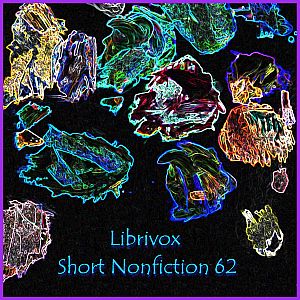
Fifteen short nonfiction works in the public domain, independently chosen by the readers. Volume 62 features several introspective essays: by T. S. Eliot (Tradition and Individual Talent), Stephen Leacock (The Decline of the Drama), Carlyle (The Sacredness of Work), and Jonathan Swift (A Meditation Upon a Broomstick). Life questions are further explored by theologians Agrippa von Nettesheim (The Vanity of Arts and Sciences) and Spurgeon (Effectual Calling, Sermon # 73), while spiritualist Andrew Jackson Davis presents his understanding of death and dying (The Portal of the Unknown).
Public and political life are examined by Eltwood Pomeroy (The Follies of Legislators), Henry Ward Beecher (The American Flag), Franklin Hanford (Did Betsy Ross Design the Flag?), and Nicolas de Condorcet (On the Admission of Women to the Rights of Citizenship).
Vol. 62 includes biographical sketches of two men of genius, a scientist, Nikola Tesla (Hugo Gernsback) and a painter, John Singer Sargent (Henry James). Finally, a scientific look at the destructive power of sea waves is complemented by a meditation on nature's grandeur by poet Rupert Brooke, who visits Niagara Falls and is moved to " thoughts of destiny and the passage of empires." - Summary by Sue Anderson
15 episodes
Twenty short nonfiction works in the public domain, independently chosen by the readers. Volume 63 features essays on a variety of topics: the emotion of the multitude in drama (Yeats), audience (Encyclopedia Britannica), corpulence and diet (Banting), charity (Ambrose Bierce), the forgotten man (Sumner), murder (DeQuincey), suicide (Bierce), free masonry (Albert Pike), the poetic principle (Poe), and the evils of slavery (Othello). Excerpts from Kierkegaard explore his philosophy. Biographical sketches include Calamity Jane, Joseph Glidden, Lucy Bakewell Audubon, and J. M. W. Turner, while Joseph Conrad speaks to his own life in A Familiar Preface. Rounding out the volume is a fascinating 1674 meet-up with a miraculous sea-monster (probably a giant squid). Summary by Sue Anderson
20 episodes
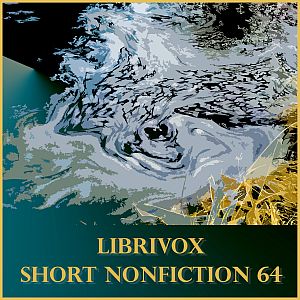
Twenty short nonfiction works chosen by the readers. Eucken's "The Failure of Speculative Philosophy," is one of several essays devoted to timeless questions. Others are by James Howell on man, nature and the universe, Samuel Johnson on procrastination and the flight of time, Schleiemacher on the social element in religion, Ambrose Bierce on immortality, and Thomas Paine and Jonathan Swift with their famous essays, "The Age of Reason" (1794-1795) and "A Modest Proposal" (1729).
Franklin Delano Roosevelt's Pearl Harbor "Day of Infamy" speech is one of various commentaries on war, politics and the polity. Others are Bierce's moving description of a solitary Civil War hero, Woodrow Wilson speaking to capitalism's spiritual crisis, Rev. Jee Gam presenting a Chinese Christian's thoughts on the Boxer Rebellion, and a partisan, Eugene Weeks, eulogizing Calvin Coolidge.
Intuitive self-direction is the theme of Lafcadio Hearn's essay "A Mystery of Crowds." Other selections that touch on personal development are Robert Louis Stevenson on literary style, Gelett Burgess on creativity and the art of play, Brann on the relative worth of the sexes, and Mary Wood-Allen on what a woman should know in picking a husband. For the musically inclined, Lawton Mackall has an amusing look at pianos, while sports enthusiasts will enjoy Benjamin Richardson's treatise on what to avoid in cycling. Artists should be interested in the biography of designer William Kilburn, who, in the late 1700s, was the first artist to seek copyright for his original textile designs. Summary by Sue Anderson
William Tudor Jones translated "The Failure of Speculative Philosophy."
George Ripley translated "On the Social Element in Religion."
20 episodes
For more than three hundred years an intense desire has been felt by explorers to discover and reveal to the world the secrets of the immediate regions of the North Pole. Nor has this desire been confined to mere adventurers. This volume sketches the latest American efforts (from the second Grinnel expedition to that of the "Polaris"), second to no others in heroism and success, and abounding in instructive and intensely interesting adventures both grave and gay.
- Summary from the preface
45 episodes
A comprehensive and readable account of the world's history, emphasizing the more important events, and presenting these as complete narratives in the master-words of the most eminent historians. This is volume 3 of 22, covering from 13 to 395 AD. - Summary Adapted from the Title Page
38 episodes
This book tells the story of exploration in America in the words of the explorers themselves. It consists of extracts from narratives of the early discoverers and explorers of the American continent from the Northmen in 10th century to 17th century Massachusets Bay Colony. - Summary by Kikisaulite
79 episodes

Twenty short nonfiction works chosen by the readers. A review of William Carlos Williams' "Kora in Hell" by Robert McAlmon is one of several selections devoted to literature and learning. Others are H. P. Lovecraft's "Literary Composition;" George Herbert Betts's "The Mind and Its Education;" William Wells Newell's "Michelangelo as Poet;" and Thoreau's "Wild Apples." Humor receives its due in "The Methods of Mr. Sellyer: A Book Store Study" (Stephen Leacock); "The Plumber" (Charles Dudley Warner); "The Yawn of the Computer Age" (NSA Cryptolog); and an unnamed boy's "Essay on Girls." Innovation and inquiry are treated in a 17th century study "Of a Deaf Man's Capacity to Speak;" a 1794 description of color blindness (John Dalton); and an 1896 exposition on scientific kite flying. Historical topics include the status of Palestine and Syria in the 1920's; democratic socialism (Victor Considerant); Letters to Muriardachus (11th century, Anselm of Canterbury), and an Illinois flour mill's change over from horse team to gas powered delivery truck in 1913. Politics meet history in readings of an Immigration and Customs Enforcement (ICE) detainee death notification letter and two selections from the 2019 Mueller Report--the executive summaries from volumes 1 and 2. Finally, for those with the munchies or a sweet tooth, Vol. 65 has recipes from Maria Parloa's "Chocolate and Cocoa and Homemade Candy Recipes." Summary by Sue Anderson.
20 episodes
A collection of early writings of Charles Dickens under his early pseudonym, "Boz." They first appeared in various publications from 1833 to 1836. Divided into four sections, "Our Parish," "Scenes," "Characters," and "Tales." The first three sections are descriptions of various people and places, and the final section contains fictional short stories.
58 episodes
How to entertain them; with chapters on the destruction of birds, their economic and aesthetic values, suggestions for dealing with their enemies and on the organization and management of bird clubs. - book subtitle. Note: Because of its length and complexity, Mr. Kennard's "sub-chapter" in Chapter 8 entitled "Trees, Shrubs, and Vines Attractive to Birds" has been omitted, but of course is available at the Gutenberg address for this work.
13 episodes
A treatise on the increasing loudness of modern life, including philosophical and scientific discussion of what noise is, how effects us physically, mentally, and socially in cities, on railways, at home, in workplaces, and on battlefields of war. The book concludes with some strong suggestions for protecting ourselves from noise as well as for lessening noise altogether. - Summary by Amelia Chesley
11 episodes











